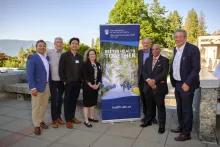
Complex health challenges require interdisciplinary approaches that lead to innovative solutions to improve health and address health inequities.
And that’s why Dr. Lindsey Richardson assembled an interdisciplinary team of investigators to address the alarming assumption that increased access to income support during the COVID-19 pandemic resulted in increased drug use, overdoses, and overdose deaths.
Dr. Richardson is leading one of six projects that received a Health Innovation Funding Investment (HIFI) Award from UBC Health’s inaugural competition. HIFI catalyzes cross-faculty collaborations to develop new teams, pursue new ideas, or translate findings from innovative health-related research.
The question we’re dealing with is: How do our institutions and social policies affect health?
Dr. Richardson is Associate Professor in the Department of Sociology in the Faculty of Arts and Research Scientist at the BC Centre on Substance Use. She is the principal investigator for the HIFI project, Can we blame the COVID-19 overdose surge on emergency income supports? Empirical evidence to support social policy planning.
“In the early days of the pandemic when emergency income supports rolled out, repeated claims in the media and elsewhere suggested that it was increased access to income support which resulted in increased drug use, overdoses, and overdose deaths among people who use drugs, which had alarming implications” says Dr. Richardson. “But while there was indeed a catastrophic spike in overdoses and overdose deaths, there was no research to support the link between the Canada Emergency Response Benefit and overdose.” She stressed that solutions to complex public health issues should be informed by scientific evidence.
Dr. Richardson brought together an interdisciplinary team from sociology, medicine, and economics to examine potential causes of the overdose surge to rectify oversimplified, stigmatizing, and damaging explanations and support policymakers in income support implementation.
Everyone’s disciplinary expertise really made for a more thoughtfully considered project. It isn’t only about gaining knowledge about overdose data—we are gaining a broader understanding of different factors that are at play in the overdose crisis.
The research team includes:
- Jane Buxton, Professor, School of Population and Public Health; Medical Lead, Harm Reduction, BC Centre for Disease Control
- David Green, Professor, UBC Vancouver School of Economics
- Mint Ti, Assistant Professor, Department of Medicine; Research Scientists and Health Administrative Data Lead, BC Centre on Substance Use
- Amanda Slaunwhite, Senior Scientist, BC Centre for Disease Control; Scientific-lead, Provincial Overdose Cohort
- Heather Palis, Post-Doctoral Research Fellow, BC Centre for Disease Control
- Allison Laing, PhD Student, Department of Sociology, Faculty of Arts
Dr. Richardson says establishing the team was a project milestone—bringing together a group of people with different knowledge and expertise who considered it important to empirically examine the assumption that was being made.
“The question we’re dealing with is: How do our institutions and social policies affect health?” says Dr. Richardson. “Everyone’s disciplinary expertise really made for a more thoughtfully considered project. It isn’t only about gaining knowledge about overdose data—we are gaining a broader understanding of different factors that are at play in the overdose crisis. The sum is bigger than the individual parts, and that’s the real benefit of doing interdisciplinary work.”
UBC Health aims to facilitate health research that goes beyond traditional departmental and institutional boundaries, and Dr. Richardson’s HIFI project demonstrates the potential of all faculties and disciplines across UBC to effect change in health.
The research team in the process of examining whether there is any basis to claims that attribute increases in overdose to COVID-19 income supports, linking data from multiple sources. Data analysis is expected to be completed in early 2022.
Posted November 12, 2021



